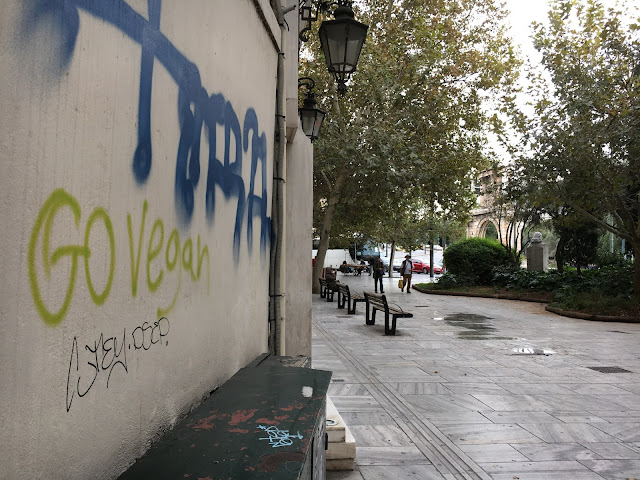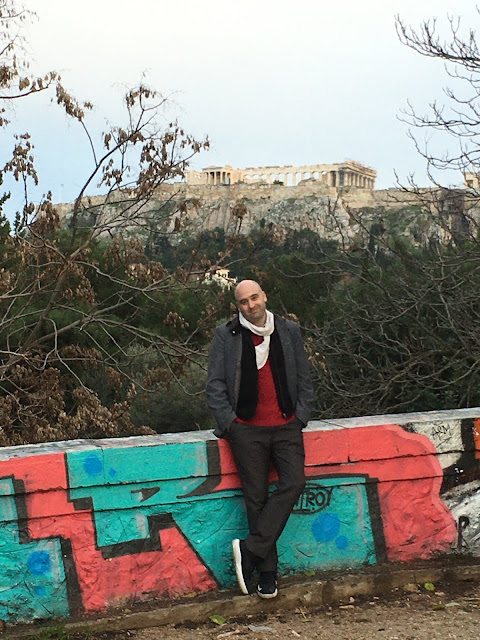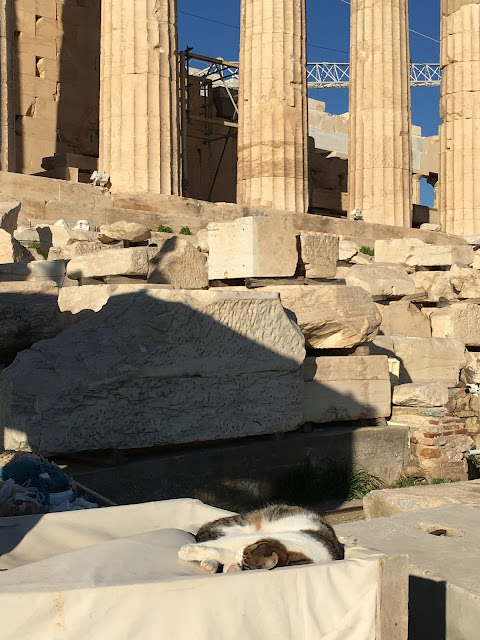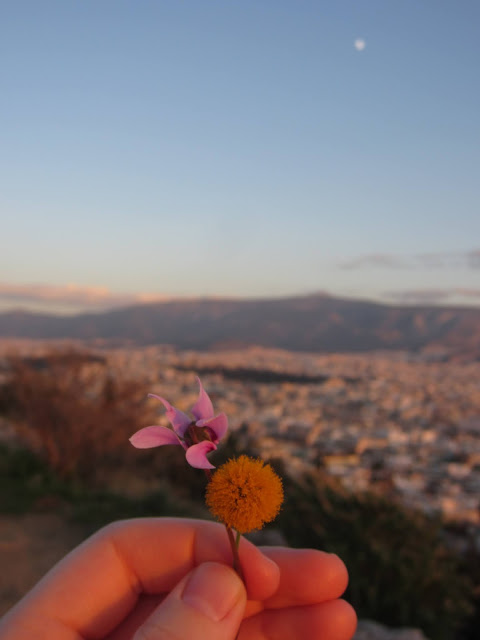How different my life would have been if COVID-19 instead had been COVID-16. I flew to Kunming, China to meet Eisel on February 14, 2017. If the pandemic had struck three years earlier, our internet-assisted love story would have been impossible. Of course, the way our love story unfolded was almost impossible as it was, but not quite.
Just a few weeks before the closure of the borders on March 21st, we moved back to Victoria, BC. This is the longest period of time we've stayed in one place since we met each other. These past nine months have probably been the most stable of Eisel's adult life.
As the year comes to an end, the border remains closed, and the case count continues to rise in both the U.S. and Canada. While in lockdown, I've had a lot of time to reflect on the past. At this time last year, Eisel and I were in Athens together. We'd met up in Toronto on November 19th and one week later we were boarding a flight to Athens. As our time in Athens came to a close, I prepared to head back to my parents' house to continue my seven-month treatment of Isotretinoin (a.k.a. "Accutane") in a small town on the outskirts of Detroit, while Eisel prepared to return to Puli, a small town in central Taiwan.
Traveling to Athens meant a lot to Eisel. In his youth, he'd been interested in learning Latin and Greek but considered it to be "out of reach," an endeavor open only to elite, private-school educated students. In his political science undergraduate degree, he'd been disappointed in every aspect of the quality of education at the University of Toronto, except for what he could learn on his own at the library, seeking out primary sources like Aristotle and Plato to teach himself what was lacking in the curriculum. He spent his twenties in Southeast Asia, independently studying Pali and bits and pieces of five other Asian languages while becoming a scholar of Theravada Buddhism. His interest in Ancient Greek philosophers may not have been at the forefront of his mind during those years, but, in his thirties, he read Thucydides's History of the Peloponnesian War as he cradled his infant daughter in his arms.
Traveling to Athens meant a lot to me, too. I'd actually been to Athens before, when I was only nine years old, traveling with my family on a Mediterranean cruise. My maternal grandparents enjoyed traveling together in their retirement, and, as they got on in age, they took an interest in the more relaxed form of travel offered by cruise lines. After my grandfather passed away, my grandmother didn't travel as much as she used to. She was getting into her eighties, and my family thought it would be an adventurous "last hurrah" for her to cruise the Mediterranean with her children and grandchildren.
What I remembered most about Athens from that first trip was how worried I felt about my grandmother as she slowly made her way up the marble steps of the Acropolis in the heat of the summer sun. She was not an athletic woman, and we all kept a close eye on her so that the matriarch of the family wouldn't suffer from heatstroke at the top of this hill, where the only way down was those same marble steps.
I was an unsophisticated American kid who'd grown up in an ordinary, suburban household in the Midwest. My father's only international travel had been to Canada, driving across the Ambassador Bridge from Detroit to Windsor, and making a business trip to Toronto where he got his car window smashed in by a petty thief. My mother had traveled to Germany as a 16-year old girl with her high school's language exchange program. (Fun fact: she got to travel to East Berlin on that trip.)
My parents weren't cosmopolitan or well-read. My mother didn't continue learning German, and her trip to Germany didn't ignite some burning desire to see the world—she was preoccupied with her nursing career, her marriage, and her three children. Whenever my father wasn't focused on running his steel contracting business, he was complaining about mowing the lawn and shoveling the snow. He suffered from a chronic disease that made these things more onerous. Many nights I saw him sprawled out on the couch or carpet, writhing in pain as the TV blared out the news, sports, or some other program. I don't blame them, but I can't remember them teaching me much about the Acropolis or the Parthenon when we went, except that I should be on my best behavior as it was an important, ancient historical site. At nine years old, I probably wouldn't have been able to fully comprehend the historical and political significance anyway, but maybe if my older cousins or brothers had been more precocious or had taken an interest in history, they could have used it as an opportunity to teach me something.
Though I held onto the happy childhood memory of my feet burning up on the red sand beach of Santorini and the relief I felt as I dove into the cool Adriatic Sea, I remained ignorant about the history of Ancient Greece. That is, until I got together with Eisel.
Unlike my cousins and brothers, he worried about my education, or lack thereof. I struggled with an inferiority complex during the first few years of our relationship because of this gap between his encyclopedic knowledge of world history and my relatively scant knowledge of important world events. During the summer of 2018, we were unemployed, preparing for baking school in the fall by teaching ourselves to bake bread and vegan cakes. He knew how deeply this inequality in our knowledge base was bothering me, it led me to lash out at him when I felt stupid, or that he was the only one who had facts he could draw on in a conversation. If my level of objective self-awareness is now at an 8, I was somewhere around level 3 when I met him. Looking back now, I regret that I was an asshole to Eisel because of this resentment I carried with me, this "How dare you make me feel so stupid?" attitude I wore like a millstone around my neck. He meant well, and he could see that I wouldn't make the effort to improve my knowledge on my own. I needed a kick in the pants to do anything other than wallow in self-pity over how the American education system had failed me.
During that gap in our schedules, when we were planning to open a bakery but the course hadn't yet begun, the question was open for us both to consider: what should I be reading during this last window of opportunity (before many years of being very busy, we presumed) for me to educate myself? He argued, forcefully, that before I started baking school, I should devote my time to reading a short list of the most important Ancient Greek authors: Plato, Aristotle, Xenophon, and, of course, Thucydides. Good or bad, right or wrong, wise or stupid, the important world leaders of the past four hundred years had read Aristotle—even if they had been forced to, against their will. The years of the Athenian Empire were unparalleled in their influence on the history of the world. Ancient Athens was this golden age of free-thinking and innovation in politics and philosophy, pointing a possible way forward for the future of Europe that had been abandoned during the Dark Ages, during the long epoch of the dominance of Christianity.
Honestly, my mind was preoccupied with vegan baking and how starting this career could lead to us settling down and starting a family. I wasn't really interested in reading Ancient Greek texts—during that phase of my life, I wasn't interested in reading much at all, frankly. I was still in the mindset that reading was something I primarily did in order to pass a class or entertain myself, not something I particularly wanted to force myself to struggle through for the sake of my own self-improvement. In hindsight, I approached the task thinking, "Fine, if this is what it takes to be Eisel's girl, I'll read Thucydides."
But it wasn't easy. I felt stupid. I was unfamiliar with the geography and historical figures, and even getting a grasp on the dates was, at times, difficult. I took extensive notes on The Constitution of the Athenians, The Spartan Constitution, Euthyphro, The Trial of Socrates, and The History of the Peloponnesian War. Eisel encouraged me to start a YouTube channel of my own and record videos about what I was reading. I'm glad I followed his advice because now I can look back and remember how I was struggling with both learning to record a YouTube video and with learning how to teach an audience about what I had read. I read History of the Peloponnesian War a second time, but I still felt too intimidated to record a video about it given the density of the text.
Fast forward a few months and we had achieved the ignominious status of "baking school dropouts." I'd pushed our relationship past the brink of disaster too many times to count. My status in Canada was compromised by having dropped out of baking school, and I would have to leave when my study permit expired. One possibility Eisel suggested was that I complete a Teaching English as a Second Language course with the intention of moving to Taiwan and working as an English teacher. He wanted me to go alone, but I begged him to come with me. The geography of his life remained tied to his divorce and child custody paperwork, as well as his own enrollment at the university. We moved to Taiwan together in March 2019, and we planned to stay long term. At this point, acne becomes a significant part of the story: I had a health problem that manifested itself very obviously on my face, and this kept me from getting hired as an English teacher. In June, I decided to go home for medical treatment. That turned into a 9-month convalescence in my childhood home with my mom, dad, and my ailing 75-year old uncle, who was also convalescing.
Meanwhile, Eisel was severely isolated and depressed in Puli, reeling from the last separation from his daughter, and oppressed by the dark cloud I'd left in his life. He needed hope. He was starting from a blank sheet of paper again, wondering where on this planet he could find some promise for a better future. At the time, he was researching the possibility of immigrating to Israel. To show my commitment and support, I started teaching myself the Hebrew alphabet, making use of Duolingo and the Pimsleur Hebrew course from my local library.
You probably already guessed from the start of this post, but we didn't end up moving to Athens. Not yet, at least.
A couple months ago, a friend asked me: "How do you and Eisel go about visiting cities like Paris?"
I sent him a lengthy reply which I'll share here:
We've been thorough in preparing for each trip. For the first couple years of our relationship, Eisel did the lion's share of the planning. After I'd learned his method and watched how each of the steps played out in practice, I was able to do all of the planning for our trip to Athens last November. That was when I was living in Michigan and Eisel was living in Taiwan. I took out guide books from the library; I literally transcribed a significant portion of one of the books and sent Eisel a PDF copy of the guide.
I made a list of the most appealing museums and attractions based not only on the guide books, but also based on reviews online and YouTube videos uploaded by tourists and locals. I familiarized myself with the map of the city, figuring out the districts in which we'd be spending most of our time. I searched around on Airbnb, and I found a place within walking distance of the Acropolis and the Pnyx.
I booked the place for a 20-night stay, and, on Airbnb, many places offer a pretty good discount if you stay for more than a week. Because of the length of our stay, we had time to explore. Nearly every day we walked for miles around the city. We got to experience the city street below us transform into a market every Sunday at the crack of dawn.
We also got familiar with using the train to get to the Port of Piraeus. The primary reason why we were there so long was to determine what it would be like to live there on a daily basis and to see if Eisel and I could live and/or invest in Athens. Broadly speaking, that’s how Eisel has approached almost all of the places we’ve visited together. Given our peculiar lifestyle these past three and a half years, we’ve stayed in each city for enough time to form an internal map of the place in our minds. In Paris, Brussels, Nice, Mannheim, Bangkok, Chiangmai, Taipei, Taidong, etc. I got a sense of what life is like for locals, what’s available at restaurants and at grocery stores for vegans such as ourselves, how to navigate public transportation, the natural landscape and what kind of weather conditions to expect, and so on.
When we went to Greece, we both made an effort to learn some of the language. In the months leading up to the trip, I taught myself the Greek alphabet and used the language-learning apps Duolingo and Drops to at least learn how the language sounded before I arrived. During our stay, Eisel and I went to bookstores, searching for Greek language resources in addition to resources for other languages we studied (i.e., Chinese and French). In Athens, most people are fluent enough in English that we didn't need to communicate in Greek at all, but Eisel commented that he felt a bit ashamed that he didn't learn as much Greek as he would have liked to before arriving. This is part of his philosophy on traveling to a foreign country: don't expect everyone to be able to speak to you in English when you're in a foreign country—make an effort to learn some of the local language.
I learned more traveling with Eisel than I did on the more strictly-planned vacations I took as a child with my family or with high school tour groups. When you're the one responsible for making the most of your time in a foreign place—when you aren't just passively absorbing what a tour guide tells you—you learn more about the places, including learning to roll with the punches when things don’t go according to the plans you'd devised.





















No comments:
Post a Comment